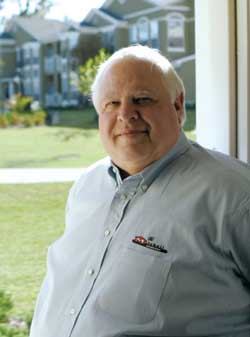Back in Business
Within days after a hurricane, Mitchell has properties up and running. How? Because the company can get subcontractors to the rebuilding sites fast and keep them there.
One reason: the company’s size. “Mitchell is a big general contractor,” Compass Bank’s Granger says. “All of their labor suppliers realize the hurricane recovery will be around six to eight months, but Mitchell will be around for 20 years. They’re the big animal, and [subcontractors] better treat it well if they want to eat for the next 20 years.”
Still, managing such work in a disaster zone is a logistical challenge. First, laborers from outside the area need a place to stay. So Mitchell opens up the properties, allowing workers to live in undamaged units. It’s a tight fit: Given the limited housing available, sometimes as many as 20 workers will stay in a condo or an apartment. Stefan and Saint have even invited contractors to stay in their own personal condos in the Legacy Villas in Gulfport, Miss., when they were repairing the damaged complex.
Second, building materials must be available at the site. For the most part, the company has been able to get supplies to the damaged properties. Look at the Mitchell-built and -managed Grandview Apartments in Biloxi. “They had stockpiled shingles when they saw the storm was coming,” says Denny St. Romain, president of BCOM Investment Advisors in Miami, which owns the property. “They had the materials to get it back up quickly. Before the storm, they prepared for the repairs that need to be done. We kept operations up the whole time.”
Third, subcontractors must be paid. While delayed insurance payouts have created cash flow problems for many Gulf Coast apartment owners and managers, Mitchell has financial wherewithal to pay for property repairs before its multifamily owner clients receive their insurance money. “Even though [Mitchell doesn’t] own the properties, they helped get them back online and helped make them fully functioning in advance of any insurance check ever being received,” Granger says.
Fortunately, Mitchell did manage to collect all the expected checks. Its strategy: personal meetings with insurance representatives at Mitchell’s Mobile offices. Despite plenty of yelling and screaming on both sides, Stefan negotiated agreements with each carrier. “One of the reasons that we manage for a lot of people is because, in a storm, it’s a nightmare to deal with insurance and get your property back up and operating,” Saint says. “Knowing they have us there can help.”
It certainly does.
The Villas at Legacy and Legacy Condominiums at Gulfport–two Mitchell-built properties in Gulfport, Miss.–were both hit by Katrina. “Mitchell came in, got their supplies ordered, and started,” says Suzanne Guyton, who manages the condo properties. “They took what would have been an overwhelming situation and made it bearable.”
Only after Mitchell has fixed all the buildings it originally constructed and all the properties that it manages will it agree to repair other structures. All in all, after Katrina, the company fixed about 25 complexes containing 3,872 units. The repairs added up to approximately $23 million.
Return to New Orleans
Now that it’s finished many of those repair jobs, Mitchell has decided to add to its Gulf Coast work by entering New Orleans, a market it left 10 years ago because of “political discomfort,” according to Saint. What prompted this decision? An impromptu marketing study by Stefan.
“One night we saw all of these out-of-state pickup trucks, obviously workmen, leaving the city,” Stefan recalls. “We did our market study on I-10. If we could buy these and get them fixed, we would know where the customers are.”
As of press time, Mitchell had closed on one New Orleans complex with 161 units and was in contract negotiations to purchase another property with 460 units.
It represents a big opportunity for the experienced Gulf Coast company. But early in the repair work on the New Orleans property, Stefan realized what made the company leave the Crescent City in the first place: red tape and outright corruption. “We had to get letter from the electric, gas, and cable television companies,” Stefan says. “It was like pulling teeth. When you can’t get these simple letters, it starts making lenders nervous.”
With letters in hand, Mitchell is now wooing investors. Ordinarily, it would hold the repaired properties through lease-up, but rules for the Gulf Opportunity Zone (a program in Louisiana, Mississippi, and parts of Alabama that provides tax benefits to post-Katrina investors in those areas) require that the company line up its investors early. “They have to be in place when the project is put in use,” explains Donald Denham, manager of Mitchell’s apartment development department.
Despite the challenges, the company wants to purchase more Crescent City properties in need of repair, as long as they are not in a flood zone. “We looked at about five different jobs,” Stefan says. “We walked every unit on every job and sorted them out. We looked at a combination of price, location, and unit mix.”
Mitchell executives are controlling their enthusiasm, though. “I don’t want to be last [into the market] because they’re not all coming back,” he says, referring to displaced New Orleanians. “The market is going to be good for awhile until you house the people who want to come back,” he predicts. “But one day it will fall off of a cliff.”
Until then, Mitchell will be bringing its discipline and disaster plans to New Orleans. “If Mitchell gets in there, they won’t play around,” predicts Mike McDonald, owner of Commercial Renovators, a Mitchell subcontractor in Daphne, Ala. “They get in there, get complexes ready, lease them out, and go to the next one.”
Regardless of the weather.
